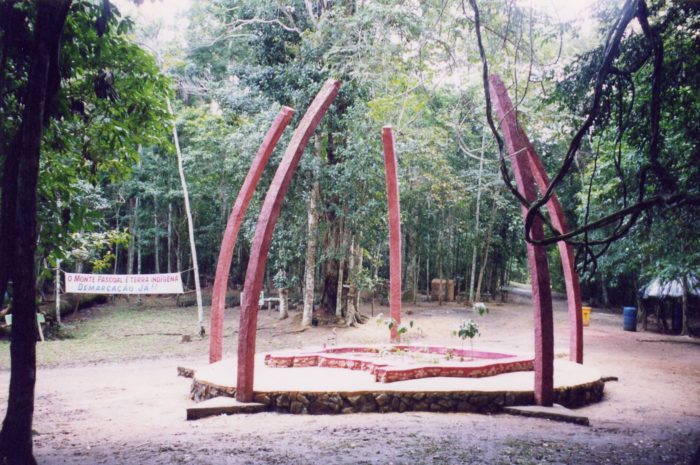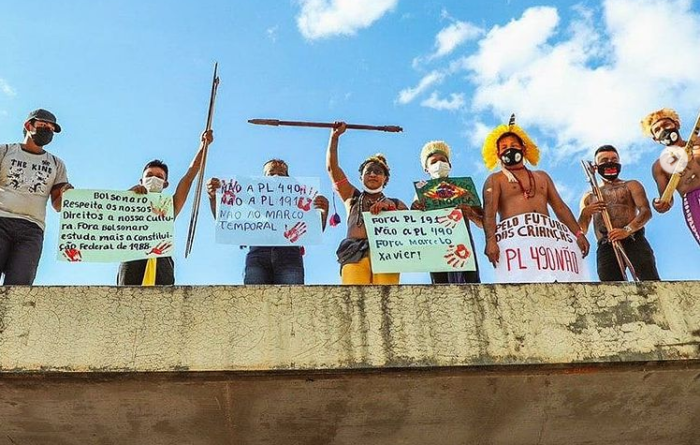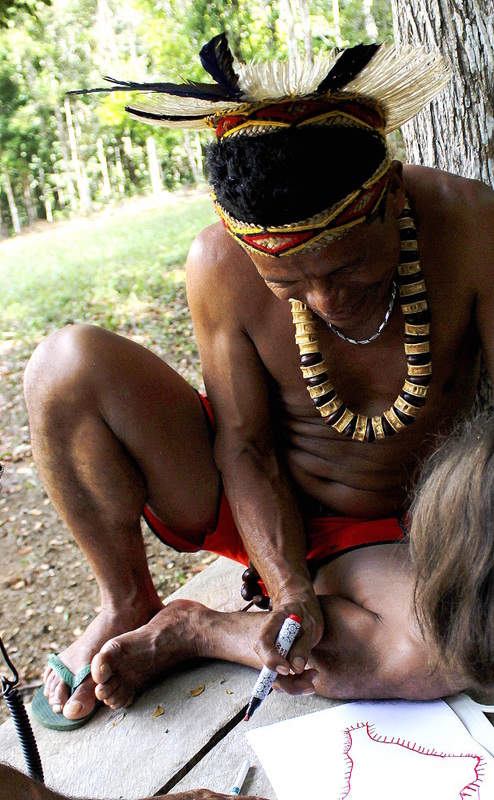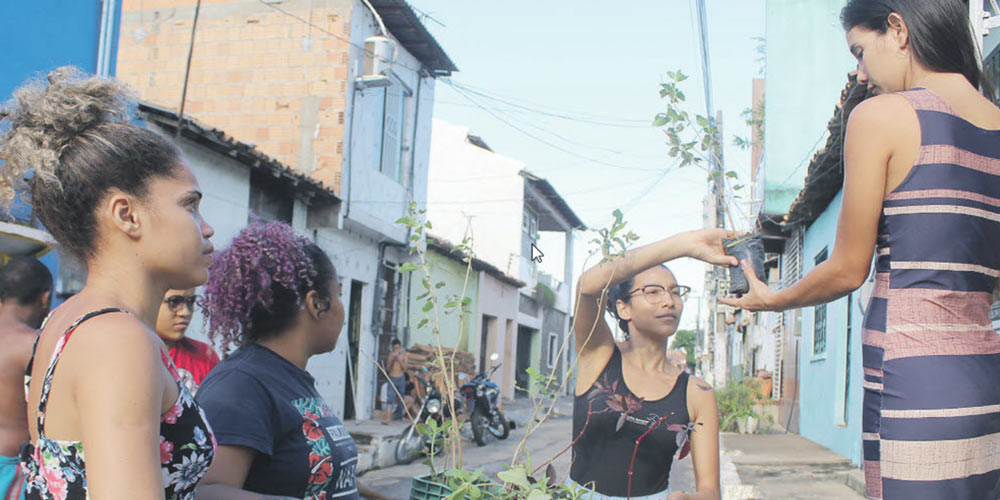Dan Baron accompanies Braga, a Pataxó indigenous chief, at the monument to the 500 Years of Resistance by the Indigenous Peoples of Brazil, in Coroa Vermelha, Porto Seguro, South-East Bahia. They celebrate the restoration of the fifth bow, knocked down by an Ipê tree and rebuilt by a new generation of Patxôhã-speaking activists. Braga imagines his testimony to the senators in Brasilia in August 2021, when Congress debated PL490, which would invalidate all legalized land-claims made by indigenous communities after 1988. Peaceful demonstrators earlier in the year had been met with tear gas and violence from the military police. The Pataxó and other indigenous peoples plan to return to Brasilia to pressure the senators.


Braga turns off his cell phone, opens the fragile curtain that separates his bedroom from the front room, leans the borrowed backpack against the door and enters the darkened room, singing:
I’m a brave Indian of the forest
He tries to shake off the delirium of tear gas and all-night counsel from his pillow:
I’m a brave Indian of the forest
He slides open the wooden slab and looks out the window, caressing the village square with his gaze:
My spear is strong, it hits and pierces…
I see Braga, twenty years earlier, eyes smiling, singing the same song in the circular dance at night, weaving unity through the ritual around the medicinal garden protected by the five bows of invisible strings. I hear the same voice, echoing in the forest, singing the emerging narrative of the two thousand Pataxó building the monument 500 Years of Resistance of the Indigenous Peoples of Brazil. That intimate, collective, playful and lucid voice, which cultivated and still cultivates bonds of trust and friendship between us to this day, which understands and celebrates the transforming power of the rooted and soaring imagination, free, daring and engaged.
Our eyes meet. In a fraction of a second, I relive all the August 19s we have lived together: dancing the inauguration of the Monument in 2001; reading its narrative in a book by the flickering candlelight in 2004; and today, celebrating the restoration of the fifth bow, knocked down by an Ipê tree that witnessed the arrival of the caravelas of confusion, rebuilt by a new generation of Patxôhã-speaking activists. Braga smiles and our eyes embrace.
When I get enraged, no one holds me back
no one holds me back, holds me back…
I fold up my mattress and return to his side. Jaca, mango, sapucaia and cupuaçu perfumes soothe us and a cappella of echoes of white monkeys, aratacas, macaws and parrots greeting, courting and chatting, delights us. Braga takes his headdress, necklaces, loincloth and spear hanging from the cracked earthen wall and we enter the sanctuary of the kitchen and its backyard.
Maria is already hunched beside her little window sorting beans in the soft light of dawn, fifty years of invisible struggle hardened in the curvature of her spine, a silent testimony imprisoned within her illiterate shame. She gestures with an abrupt glance at the weak coffee and cooked cassava on the table, the yield of drop after drop of water put to one side to support the family’s daily land-reclaim.
How do you withstand so much drought? I ask.
I pour a finger of coffee into each cup, but Braga is already in the Senate in Brasília, living his destiny.
With feet rooted in five centuries of resistance, his body aligned by his jacaranda spear, his chest glistening with red brazil-wood seeds, and his eye honed by millennia of science, he summons the spirits in his headdress and meets the gaze of each senator and judge in front of him:


I am brother, husband, father and grandfather Guaru Pataxó, son of chief Manoel Santana, Pataxó chief of the Foot of the Mountain village, listener to and guardian of the forest, springs and offspring of Easter Mountain. When you have to rip out centuries of gold from the very teeth of your greed to buy a simple dish of rice and beans, and be incarcerated for the crime of ecocide to get a sip of water or fresh air, it will be too late….
Your own grandchildren will be born refugees from the burning horizon…
Braga trembles, fury tightening his voice…
Approve the PL490, and your lordships will provoke the native world to throw the spear for life!
He sits on a crate, grabs his coffee and opens his cell phone. Maria bends down and picks up a fallen bean on the floor. Suddenly, a video vibrates the kitchen with thousands of maracas, voices and feet!
My spear is strong, it hits and pierces…
I reflect…
I take a risk…
Amigo, what transformative action are you taking to Brasília?
Braga pauses the ritual in Brasília. I follow an intuition:
How did you welcome the Portuguese? In 1500?
He rests his cup on the table. Maria tilts her head.
Silence.
With honey, Braga finally recalls, visualizing, distant.
From native bees with no sting, Maria completes the thought…
A proposal emerges:
Braga, how will we open the imagination of senators and judges? The vast majority are bigots, bought, waiting for chiefs with blood in their eyes, spears in their mouths. Accusing banners. They know Brazil is afraid. People still think that the forest is that ‘Indian thing’. Why not recover that indigenous reflex? Why not take little jars of honey with no sting? One for each senator and judge?
I pause.
A ritual of invitation to plant?
It will disarm the media, touch the people, enchant the world…
The chief’s eyes narrow. Fill with tears. He looks out the window.
A smile appears in the corners of the bent woman’s eyes.
Braga gets up and returns to the front room.
He draws back the fragile curtain…
Main image: The monument to The Other 500 Years (Monte Pascoal, Bahia, 2000-2001)


